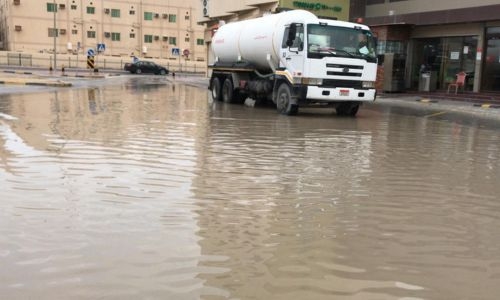As Bahrain prepares for the upcoming rainy season, officials in the capital governorate are taking proactive measures to prevent the severe flooding that occurred in April. With lessons learned from last year’s devastating floods in Sanad, Nuwaidrat, and Sitra, the Capital Municipal Council is introducing a new strategy to protect vulnerable communities from the threats posed by heavy rainfall. A recent session titled ‘Preparation for the Rainy Season’ brought together officials from the Ministry of Works and the Capital Municipality to discuss measures aimed at mitigating the impact of downpours.
During the session, Engineer Saleh Tarrada, Chairman of the Capital Municipal Council, emphasized the importance of collaboration between various government departments and civil society to create effective response plans to protect infrastructure and ensure residents’ safety. Dr. Kholoud Al Qattan, Vice Chairperson of the Council, echoed the call for teamwork and urged residents to stay informed and take preventive measures to safeguard themselves and their families. The session covered topics such as improvements to water drainage systems, infrastructure readiness for heavy rain, and operational plans to tackle flooding.
Yusef Al Bannaa from the Ministry of Works highlighted the preparations in place, stating that the Capital Municipality’s team comprises 15 staff members, including eight inspectors and a fleet of eight tankers, alongside eight additional pumps on standby. He acknowledged past drainage issues, particularly in areas that experienced the most damage during April’s downpours, such as Sanad, Nuwaidrat, and Sitra. MP Ahmed Al Salloom emphasized the need for a comprehensive rainwater drainage plan to address the challenges posed by land reclamation and housing development projects.
MP Al Salloom also mentioned that budget allocations are in progress following discussions with the Ministry’s undersecretary, underscoring the importance of attending meetings of the Capital Municipal Council to address urgent matters and enhance services for citizens. He highlighted that discussions on rainwater management are part of a national initiative by the Cabinet to implement a rainwater drainage plan across Bahrain in stages. This work is crucial in reducing reliance on desalination and ensuring a reliable water supply, especially in the face of climate change and increased rainfall.
As the session concluded, the Capital Municipal Council reiterated the necessity for continuous dialogue to ensure that plans remain relevant in light of changing weather patterns. They stressed the importance of involving all parties to guarantee a safe and disruption-free rainy season. With a focus on teamwork, collaboration, and proactive planning, Bahrain is taking steps to mitigate the impact of heavy rainfall and protect vulnerable communities from the threats posed by flooding.































